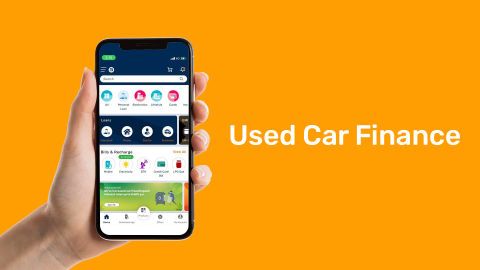Looking for a used car in your city? Whether you are searching in Pune, Delhi, Bengaluru or anywhere else in India, the options are plenty. Today, you can explore well-maintained used cars online, compare features, and shortlist vehicles—all from the comfort of your home.
Buying a used car makes sense when you want value for money. You get lower insurance costs, a wider range within your budget, and lower depreciation. But before you close the deal, there is one thing you must not skip—a used car inspection.
A detailed used car inspection checklist helps you evaluate a vehicle’s actual condition before purchase. Once you shortlist your car, use this guide to inspect it thoroughly. And when you are ready to buy, check your pre-approved used car loan offer with Bajaj Finance and enjoy quick, hassle-free financing.
What does used car inspection mean?
A used car inspection is a full check-up of the car’s physical and mechanical condition before you buy it. The aim is to assess whether the vehicle is safe, reliable, and worth the price.
It includes a detailed examination of:
- The exterior for damages, dents or rust
- The interior for wear and function
- The engine and under-the-hood systems
- A test drive to check performance and handling
A proper used car checklist for inspection helps avoid unpleasant surprises and lets you make an informed choice. It is a key part of the pre purchase car inspection process.
Why is used car inspection important?
When buying online, you often cannot physically check the car until delivery. This makes a used car inspection even more important. It gives you insights into the car’s actual condition—beyond what is shown in pictures or mentioned by the seller.
Why should you not skip this step?
- It helps you find issues that are not visible at first glance
- It allows you to negotiate the price based on the car’s condition
- It ensures that you buy a safe, well-maintained vehicle
Used car inspection checklist
Use this easy-to-follow checklist to ensure you inspect every part of the vehicle thoroughly before buying.
1. Exterior inspection:
Start by walking around the car and checking the outer body. Look for:
- Scratches, dents, and rust spots on doors, fenders, and bumpers
- Paint mismatches, which may indicate past repairs
- Tyres, including tread depth, even wear, and cracks
- Headlights, tail lights, and indicators for proper functioning
- Mirrors and windows—check for cracks, chips, and smooth operation
- Open and close all doors, the boot, and the bonnet—they should not stick or make noise
2. Interior inspection:
Move to the inside and pay attention to comfort, cleanliness, and working parts:
- Seats—check for rips, stains, sagging, or non-functional seat adjustment
- Dashboard—ensure all buttons, switches, and lights work
- Air conditioner and heater—test cooling and heating performance
- Music system—check speakers, Bluetooth, and AUX/USB ports
- Dashboard gauges—verify if the fuel gauge, speedometer, and odometer function correctly
- Roof liner and carpet—look for stains, water damage or odour
3. Engine inspection:
The engine is the heart of the vehicle. Open the bonnet and check for:
- Cleanliness—a dirty engine may indicate poor maintenance
- Leaks—look under the engine for oil or coolant leaks
- Unusual noises—any ticking, knocking or rough idle during startup
- Belts and hoses—look for cracks, fraying, or looseness
- Battery terminals—check for rust, corrosion or loose wiring
- Exhaust smoke—blue or black smoke may mean engine problems
Tip: Ask for service records to know if the engine has been regularly maintained.
4. Test drive:
This step confirms everything you have seen so far. Always insist on a test drive before you decide.
While driving:
- Observe acceleration and braking—they should be smooth and responsive
- Steering—there should be no vibration or pulling to one side
- Gear shifts—manual or automatic, they should not jerk or slip
- Suspension—drive over speed bumps to feel if the ride is too bumpy
- Listen—turn off the stereo and focus on strange noises
Need help with car financing? Check your used car loan eligibility and make your car buying experience stress-free.
How long does the used car inspection take
A proper used car inspection generally takes between one to two hours. The exact duration depends on several factors, such as the car’s age, the complexity of its systems, the number of issues found, and how thorough the inspection needs to be. A basic visual inspection, which covers the car’s exterior and interior condition, usually takes about 30 minutes. A more detailed mechanical check—examining the engine, brakes, transmission, and suspension—can take 45 to 60 minutes. After this, the test drive, followed by a discussion with the mechanic about the car’s on-road performance, typically adds another 15 to 30 minutes. If the vehicle requires additional diagnostics, such as scanning for error codes or checking specific warning lights, the inspection might take longer. It is advisable to allocate sufficient time for the entire process, so you can understand the findings in detail and make a confident, informed decision before purchasing the vehicle.
Taking the time for a thorough inspection ensures a smarter purchase. Once you have shortlisted the right car, don’t forget to check your used car loan eligibility to make your buying journey more convenient and stress-free.
Benefits of used car inspection
A used car inspection checklist is not just a step in the buying process—it is a protective measure that can save you money, prevent safety risks, and help you make a smart investment. Whether you are a first-time buyer or switching to a more fuel-efficient car, knowing the benefits of a detailed inspection will help you understand why it is essential.
Here are the key advantages of conducting a thorough pre purchase car inspection:
1. Uncover hidden issues
A pre purchase car inspection helps uncover hidden problems that may not be obvious during a quick visual check. Issues such as engine oil or coolant leaks, worn brake pads, or faulty suspension may only show up with a thorough inspection. Additionally, the mechanic will check for electrical problems, poor repairs from past accidents, and structural damage. Identifying these issues before purchase helps avoid costly repairs and ensures the car is safe to drive.
2. Cost savings
Investing in a used car inspection saves money in the long run by preventing expensive surprises. If the inspection uncovers issues, you can either negotiate a lower price or ask the seller to fix them before the purchase. Early detection of problems helps you avoid costly repairs down the road, and ensures you’re aware of future maintenance needs, such as replacing worn-out tyres or brakes. This way, you’re better prepared financially for car ownership.
3. Enhanced safety
Safety is a priority when purchasing a used car. A thorough inspection evaluates critical safety features, including the braking system, tyres, and suspension. Worn-out tyres or faulty brakes can pose serious risks on the road, leading to accidents. A professional inspection ensures the car is roadworthy and provides peace of mind knowing that your new vehicle is safe to drive. It also checks seatbelts, airbags, and lights, which are vital for your safety while driving.
4. Peace of mind
A used car checklist and inspection offer reassurance that you are making an informed decision. With a professional inspection, you can be confident that the car has been thoroughly checked and is in good condition. Knowing that a mechanic has evaluated the vehicle’s key components eliminates worries about hidden defects or potential breakdowns. This peace of mind lets you focus on enjoying your new car, knowing it’s reliable and ready to provide years of service.
Buying a used car can be a rewarding experience, especially if you make the right checks. This used car inspection checklist gives you all the steps you need to follow. It helps you pick a car that is not only affordable but also reliable.
And do not worry about payments. Check your pre-approved used car loan offer and drive home your desired car.




